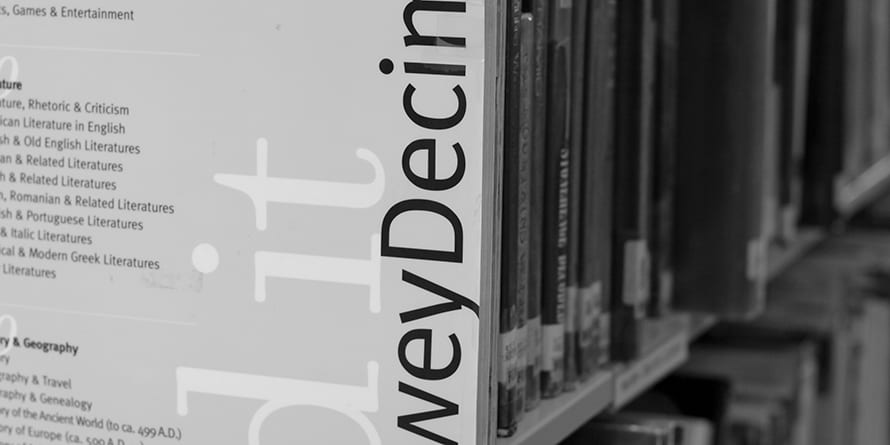Melvil Dewey’s birthday is in December. For many, his name is synonymous with libraries. We grew up learning the Dewey Decimal System to find books in our school and local libraries. The majority of library visitors probably put very little thought to this system. And why should we? If we find what we need, why does it matter how it’s classified?
The answer is that we in the library world should and do think about how things are classified on your behalf, and how that classification affects the communities we serve (that’s you). What should libraries do when the classification system we use, or rather, rely on, doesn’t fit anymore? Maybe we should change it. Maybe we should just tweak it. Maybe we should dump it altogether.
But doing that isn’t as easy as it seems. This system is embedded into everything we do. The DDC system is important for many reasons, and it has served us for a long time (almost 150 years), and right now there isn’t a universal system that works for all people in all places. Until there is, we'll probably stick to it. But here's some stuff you might not have thought about.
Move Over, Melvil! Momentum grows to eliminate bias and racism in the 145-year-old Dewey Decimal System
Author: Christina Joseph
From: School Library Journal (Vol. 67, Issue 8)
This article explains how some libraries are updating their classifications to fit their communities. There are a bunch of real-life examples of schools helping to get books to students by improving the classification system they use to organize those books.
In 2019, the American Library Association (ALA) voted unanimously to strip Dewey's name from its top honor, citing a history of racism, anti-Semitism, and sexual harassment. "Whereas Melvil Dewey did not permit Jewish people, African Americans, or other minorities admittance to the resort owned by Dewey and his wife," reads the resolution approved by ALA.
The push to slowly shift away from some of Dewey's overtly biased categorizations comes amid a greater effort to decolonize--or build racially equitable--libraries in general. Simply put, it's an attempt to be more inclusive of voices of color, to highlight diverse perspectives, and to decenter whiteness, wrote Nicole A. Cooke, an associate professor at the University of South Carolina, in an op-ed in Publishers Weekly last year. It's not easy and it can't be done all at once, librarians say. Rather, it's a thoughtful, continuous process.
Found in Gale Academic OneFile
Mitigating Implicit Bias: Diversity, equity, and inclusion in action
How can bias in library classification systems affect people who use the library? How should that bias be addressed? This one has explanations about bias, mitigating it, and how the curriculum for a series of library workshops is helping library professionals think about the choices they make.
Authors: Molly Higgins and Rachel Keiko Stark
From: American Libraries (Vol. 52, Issue 1-2)
Bias in library systems directly affects patrons' abilities to locate materials and experiences in the library. Librarianship is 83% white, according to a 2019 US Census Bureau survey. If diversity is a core value of the profession, why are librarians in the US less diverse than the general population? It may be that institutional and personal biases, including implicit bias, produce this difference.
Found in Gale Academic OneFile
Mitigating Bias in Metadata: A Use Case Using Homosaurus Linked Data
This article is very academic. It’s about, and I quote, “a linked data controlled vocabulary." I’m a librarian, and I honestly couldn’t put that into normal language for you. But there are some things in here that are worth reading about how librarians and archivists try to make the systems we use better for everyone, and especially for marginalized communities. Using language that people actually use about themselves, language which is inclusive and representative, helps people find things, and that’s what libraries are all about. Updating systems that we’ve used for almost 150 years is vital work. So, if you’re up to it, slog through the academ-ese and read through this one.
Authors: Juliet L. Hardesty and Allison Nolan
From: Information Technology and Libraries (Vol. 40, Issue 3)
Paying attention to the controlled vocabularies applied to archival description helps to change the narrative and the power structure of the historical record, centering those who have been marginalized and oppressed and increasing discoverability and access to their stories and perspectives.
Found in Gale Academic OneFile
Want to see more? Visit the E-Library and try out any of the myriad resources we offer. You might lose a few hours there, but it will be time well spent.
Don’t have a card yet? Get a library card online. Once you have one, the E-Library is here for you, 24x7x365.



